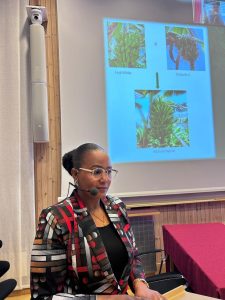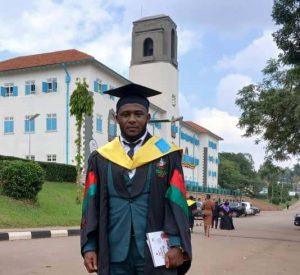Over the years, the International Institute of Tropical Agriculture (IITA) in Uganda has made significant strides in Agricultural Research and Development in the region. One of the key pillars of IITA-CGIAR‘s success is its commitment to capacity building, empowering the next generation of agricultural scientists and researchers in Uganda and on the continent.
When IITA started working in Uganda in 1992, one of the goals was to build the research capacity in the country. The first generation of Ugandan scientists trained by IITA includes Dr Wilberforce Tushemereirwe, one of the outstanding NARO scientists (now retired). Others include Dr Africano Kangire, Dr Abera Agnes Kalibata, Dr Andrew Kiggundu, Dr Michael Masanza, Dr Dan Rukuzambuga, Dr Carol Makinga, Dr Libbo Aggrey, and Herbert Jagwe, among others.
IITA commitment to build capacity extends beyond the academic space in Uganda. There is recognition of the importance of hands-on training and experience, providing opportunities for young researchers to engage in practical agricultural research and development.
Capacity building initiatives
Research opportunities: IITA offers research opportunities to national and international students and young researchers, providing a platform for hands-on experience and skill development in Uganda.
Scholarships: Through the research projects, trainees, especially IITA staff, receive sponsorship for higher studies to obtain masters’ and Ph.D. degrees in agricultural-related areas.
Training and mentorship: The scientists at IITA provide training and mentorship programs, equipping young researchers with the necessary skills and knowledge to excel in their careers.
Collaborations and partnerships: In Uganda, IITA collaborates with national and international universities, research institutions, and organizations, providing opportunities for knowledge sharing, capacity building, and networking.
A legacy of empowerment
Over the years, IITA Uganda has sponsored education and training for numerous agricultural scientists, providing them with the skills and knowledge necessary to drive agricultural development in the region. Notably, the organization has supported the research endeavors of over 74 PhD, 100 MSc, and many undergraduate students from national and international universities.
Meet our newest Ph.D. and M.Sc. graduates
We are proud to feature our youngest graduates: two Ph.D. and one Masters’ degree holders who graduated recently, with the sponsorship, support and guidance of IITA in Uganda.
Dr Violet Akech
Dr Akech completed her Ph.D. in a record time of three years from the Swedish Agricultural University (SLU) in November 2024. Her Ph.D. research focused on the genetic improvement of bananas in East Africa. Banana improvement is challenging due to the crop’s narrow genetic base, clonal propagation, sterility, and polyploidy nature, which hampers the breeding process. Her thesis aimed to lay the foundation for improving the core breeding clones used in Musa breeding schemes and optimizing the breeding pipeline of the Mchare breeding program in Tanzania. The research explored the genetic diversity of bananas and novel ways of statistical modeling to identify new parents in banana breeding using the diploid Mchare banana of Tanzania as a model crop. The study’s findings have significant implications for banana breeding, highlighting the importance of additive variation and the high correlation between cycles one and two for yield-related traits to improve genetic gains. The research also demonstrated the potential of genomic relationships from genetic markers to improve estimates of genetic characteristics in diploid banana breeding. Dr Akech’s work contributes to the development of sustainable banana breeding programs, and her plans focus on expanding her expertise in genetics, genomics, and computational biology to address global agricultural challenges and contribute to sustainable food security.
Dr Diana Kirungi
Dr Kirungi, a Ph.D. graduate from the University of Ghent in Belgium, researched ‘Climate-Smart Agriculture Technologies (CSATs)’ in Uganda, exploring the determinants of adoption among smallholder coffee farmers. Climate change poses significant threats to agriculture in Uganda, with smallholder farmers being the most vulnerable. Despite Climate-Smart Agriculture Technologies (CSATs) potential to increase crop yields, improve climate resilience, and reduce greenhouse gas emissions, their adoption rates among smallholder farmers remain low due to various barriers.
Dr Kirungi’s research focused on adoption rates and influencing factors among smallholder coffee farmers, examining the role of business models in enhancing CSAT adoption, analyzing entrepreneurial and attitudinal determinants of adoption, and evaluating the business models of smallholder coffee farmers. The study provided insights into adopting multiple CSATs and their impact on climate resilience, farm income, and profit maximization. Dr Kirungi’s research contributes to the development of sustainable and resilient smallholder farming systems, and her future research interests focus on private-public sector engagements and investments in this area.
Fahad Guma
Guma Fahad, a graduate of Makerere University, researched developing a process-driven framework to analyze and measure technical debt in software start-ups, focusing on agricultural software tools.
Technical debt refers to compromises or suboptimal solutions made during software development to accelerate delivery and meet short-term objectives, often at the expense of long-term scalability and maintainability. Recognizing start-ups’ software challenges in managing technical debts, Fahad’s research aimed to fill this gap by introducing structured methods and best practices. His study resulted in developing a framework and methodologies to help software start-ups build scalable and manageable digital solutions tailored to the agricultural sector. Additionally, the research introduced technical debt metrics, which key stakeholders evaluated to ensure practical relevance.
Fahad’s work significantly contributes to advancing digital solutions in agriculture, and he intends to expand his research through potential PhD studies. His experience working with IITA in Uganda played a crucial role in shaping his research focus, and he looks forward to continuing his contributions to agricultural research and development.
These talented individuals in Uganda are just a few examples of the many students who have benefited from IITA’s capacity-building programs. We congratulate them on their achievements and look forward to their contributions to agricultural research and development.
Empowering the next generation
IITA’s commitment to capacity building is a testament to its dedication to empowering the next generation of agricultural leaders. By providing opportunities for education, training, and research, IITA is helping to build a stronger, more resilient agricultural sector in Uganda and beyond.
As we celebrate the achievements of our PhD and MSc. graduates, we also recognize the importance of continued investment in capacity building. By working together, we can ensure that the next generation of agricultural scientists and researchers have the skills, knowledge, and expertise necessary to drive agricultural development and improve livelihoods in Africa.
Contributed by Moureen Awori, Violet Akech, Diana Kirungi, Fahad Guma, and Brigitte Uwimana






No Comments